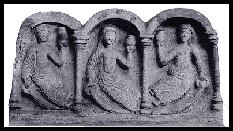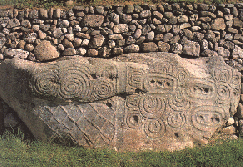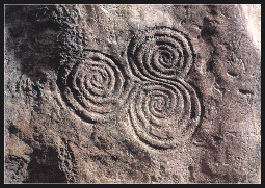The Craft of the
Wise
 The Lament of
Macha
by Jani Ni Mhorrigu,
a woman of Ulster,
Who was raised with the rebel
songs, whose grandfather was born on Falls Road.
a Version for Samhain or
Halloween
The Lament of
Macha
by Jani Ni Mhorrigu,
a woman of Ulster,
Who was raised with the rebel
songs, whose grandfather was born on Falls Road.
a Version for Samhain or
Halloween

Macha,
Once it was written of
you in Ulster
that you were Grian
Branchure - "the Sun of Womenfolk".
Your spirit lived in
hills and moors,
our rugged headlands,
sweeping shores.
Every Samhain we
thanked you
for the harvest that
fed us,
for the mast that fed
our sacred pigs.
Then you were our
mother Goddess, running the skies
as the White Horse, the
Sun Goddess.
The ancient capital of
Ulster, Ard Machae or Macha's Height,
as Armagh today proudly
bears your name.
Then came the savage
men, eager to replace you,
who could not tolerate
a Goddess they could not tame,
who would not respect a
mother's pains.
Their king summoned you
to a Samhain gathering of our people,
challenged you to
outrace his horses,
thinking you would be
weak and slow for you were with child.
Thus he set out to
overthrow the mother.
We share your pain as
you were forced to plead:
"Help me, for a mother
bore each one of you.
Give me King but a
short delay until I am delivered."
He would not delay, he
cruelly thought he had the Mother defeated,
and so you cried: "My
name and the name of that which I shall bear
shall forever cleave to
this place of Assembly. I am Macha, daughter of
The Strange Son of
Ocean."
And with that she raced
the king's horses
and defeating them lay
down and gave birth to twins.
And then she cursed the
men of Ulster: "From this hour the ignominy
that you have inflicted
on me will rebound to the shame of each one of you.
When a time of
oppression falls upon you,
each one of you who
dwells in this province will be overcome with weakness,
as the weakness of a
woman in childbirth,
and this will remain
upon you for five days and four nights,
to the ninth generation
it will be so."
And the cursed men did
not respect the mother of all life,
they tried instead to
curse her by saying she was but the goddess of their wars.
On sweet Samhain, where
Macha's gifts of harvest were once celebrated,
when she was thanked
for the mast that fed the pigs,
these savage men
brought to this feast
the heads of enemies,
calling these "the mast of Macha"
in savage mockery of
her harvest.
They claimed that life
came not from the womb but from the head.
By taking heads, they
boasted, they had captured the source of life.
Thus they denied the
wombs that bore them.
But when the time came
for Ulster to be oppressed,
When foreign princes
rode their northern necks.
Then Macha with her
sisters as the dreaded Morrigan fought to stop the men from
fighting
with all the power of
the threefold spiral.
As Brighid she stemmed
the power of Patrick
as he tried to change
one trinity for another.
And still today the men
of Ulster are accursed
when they fight against
oppression
forgetting the Mother's
cry for
all the children of her
womb.
So this Samhain we call
on you sweet Macha,
We call in the name of
all mothers,
For men never more to
fight in the name of God or Goddess.
We shout, yell, that
life is sacrosanct.
We are one with all who
have suffered
Through the death of
child or adult,
One with you and with
all lost ones
As we gather as your
people wheel beyond wheel
At this sacred Samhain
feast.
By Jani Ni Mhorrigu (Jani
Farrell- Roberts )- c96 Samhain.
 Notes. Samhain is the feast at the
end of the Celtic year. It is now more commonly known as Halloween.
Macha's curse is from an ancient Irish legend known as "Pangs of the
Men of Ulster." This is part of the preamble to Ireland's epic saga
the "Tain". (Also "The Serpent and the Goddess: Women religion and
power in Celtic Ireland" by Mary Condren, Harper Collins
1989.)
An image of Macha is preserved in
the cathedral in Armagh. She was the female aspect of the Godhead for
many. The horse was an emblem of the sun goddess - it seems she could
have been a celtic Epona. Later she became one of the triple Goddess,
the Morrigan, with her two sisters, Badb and Morrigan. In Britain she
was probably Morgan. As a war goddess she did not participate in
battle but rather in curing the wounded, in demoralizing or confusing
the male armies.
Brighid was also seen as a triple
Goddess - of poetry, of healing and of smithwork. One of her main
symbols was that of the serpent. (Thus Patrick was said by Christians
to have driven the serpent from Ireland.) However, after the rise of
Christianity in Ireland, Brigid became Saint Brigid and it was her
nuns that tended the everlasting flame kept at Kildare - the original
symbol of a sun goddess. Her feastday is Imbolc, February 1st, a
major feast of the Celtic year.
To a
longer annottted version of this
poem
Notes. Samhain is the feast at the
end of the Celtic year. It is now more commonly known as Halloween.
Macha's curse is from an ancient Irish legend known as "Pangs of the
Men of Ulster." This is part of the preamble to Ireland's epic saga
the "Tain". (Also "The Serpent and the Goddess: Women religion and
power in Celtic Ireland" by Mary Condren, Harper Collins
1989.)
An image of Macha is preserved in
the cathedral in Armagh. She was the female aspect of the Godhead for
many. The horse was an emblem of the sun goddess - it seems she could
have been a celtic Epona. Later she became one of the triple Goddess,
the Morrigan, with her two sisters, Badb and Morrigan. In Britain she
was probably Morgan. As a war goddess she did not participate in
battle but rather in curing the wounded, in demoralizing or confusing
the male armies.
Brighid was also seen as a triple
Goddess - of poetry, of healing and of smithwork. One of her main
symbols was that of the serpent. (Thus Patrick was said by Christians
to have driven the serpent from Ireland.) However, after the rise of
Christianity in Ireland, Brigid became Saint Brigid and it was her
nuns that tended the everlasting flame kept at Kildare - the original
symbol of a sun goddess. Her feastday is Imbolc, February 1st, a
major feast of the Celtic year.
To a
longer annottted version of this
poem 
- Some More Celtic
Resources

- The Tale of
Taliesin
The Goddess
Brighid
-
- CelDara: The Brigit
Page
-
- Brighid's
History
-
- Candlemas Customs
& Lore
-
-
Myths and stories about
Ancient Ireland.


Ireland
- St Patrick and the Goddess
- Carmina
Clar-innse
- (prayers/spells from a time when
Brigid, Christ and Mary were the Threesome in popular
verse)
-
-
- Mythology
-
- Irish
Place names
-
- Irish
Folklore
-
- Irish
Ancient sites
Inishmurray - Sacred
Isle
- Navan at Armagh
-
- The Bricklieve
Mountains
-
- Island
-
- herb
healer's lore
What
is the Celtic Tree Calendar?

 Click to return to the Library
Entrance.
To Contact Jani Farrell-
Roberts
Click to return to the Library
Entrance.
To Contact Jani Farrell-
Roberts



